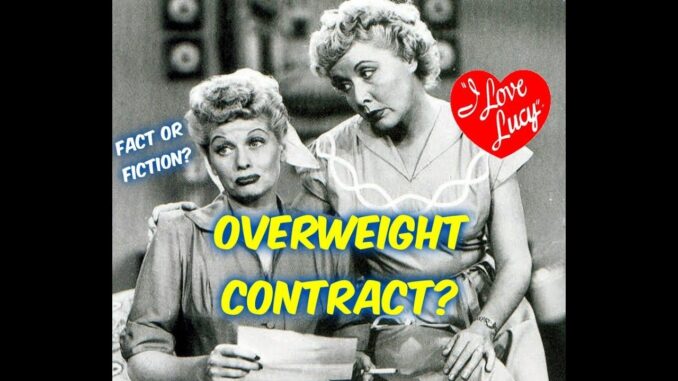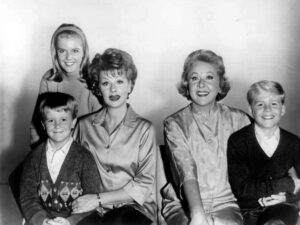
Introduction
Have you ever wondered about the secrets behind the magic of classic TV shows? Well, I Love Lucy is no exception. The iconic sitcom starring Lucille Ball and Vivian Vance brought countless laughs to living rooms across America. But behind the scenes, things weren’t always as harmonious as they seemed. In fact, one of the strangest details involved Vivian Vance’s contract. Believe it or not, she was required to weigh 10 pounds more than Lucille Ball at all times. Let’s dive into this fascinating and peculiar Hollywood demand.
Why Was Vivian Vance’s Weight Monitored?
In Hollywood’s golden age, appearances were everything. Producers believed that physical dynamics played a huge role in on-screen chemistry. For I Love Lucy, Lucille Ball was the glamorous star, while Vivian Vance’s character, Ethel Mertz, was intended to serve as her comedic foil. To reinforce this contrast, studio executives insisted that Vance always weigh more than Ball.
The Role of Ethel Mertz: A Comic Sidekick
Ethel Mertz wasn’t just Lucy Ricardo’s best friend; she was her partner in mischief. The dynamic between the two characters was rooted in their differences. Lucy was often portrayed as ambitious and glamorous, while Ethel was more down-to-earth and practical. By ensuring Vivian Vance appeared heavier, the show emphasized this contrast.
How Did Vivian Vance Feel About This Clause?
Can you imagine being told you had to gain weight for your job? It wasn’t exactly a confidence booster. Reports suggest that Vivian Vance was frustrated by this clause. She was a talented actress who brought Ethel Mertz to life with impeccable comedic timing, but being pigeonholed into a specific physical appearance was undoubtedly disheartening.
Lucille Ball and Vivian Vance: A Complex Relationship
While they had undeniable chemistry on-screen, their off-screen relationship was complicated. Lucille Ball was the undeniable star of the show, and the weight clause served to ensure she remained the center of attention. This dynamic sometimes caused tension between the two actresses, though they ultimately shared a deep respect for one another’s talent.

Was This Weight Clause Common in Hollywood?
Sadly, yes. Hollywood in the 1950s was rife with physical demands and beauty standards, especially for women. Actresses were often subjected to weight clauses, restrictive diets, and even surgeries to maintain their appearance. While Vivian Vance’s case may seem extreme, it wasn’t entirely unique.
Vivian Vance’s Approach to the Weight Clause
Did she comply willingly? Not exactly. While Vivian Vance fulfilled the requirements of her contract, she didn’t always do so without resistance. She was known to push back against some of the more unreasonable demands, but in the end, she had to play by the rules to keep her role on the show.
The Cultural Impact of Ethel Mertz
Despite the unfair clause, Vivian Vance’s portrayal of Ethel Mertz became iconic. She brought warmth, humor, and relatability to the role, making Ethel a beloved character. Her performance proved that talent and charisma could outshine superficial demands.
Did This Clause Affect Their Friendship?
It’s hard to say for sure, but the weight clause certainly didn’t help matters. While Lucille Ball and Vivian Vance maintained a professional relationship, the added pressure of such clauses likely added strain to their friendship.
How the Weight Clause Reflected Societal Norms
The weight clause wasn’t just a Hollywood quirk; it reflected broader societal norms of the 1950s. Women were often judged by their appearance, and these standards were enforced both on and off-screen.
Breaking the Stereotypes
While the weight clause was a product of its time, Vivian Vance’s talent helped to challenge stereotypes. She showed that comedic roles could be just as impactful as glamorous ones, paving the way for future actresses to embrace diverse characters.
The Legacy of Vivian Vance and Lucille Ball
Together, Lucille Ball and Vivian Vance created one of the most iconic duos in television history. Despite the challenges they faced, their on-screen chemistry remains unmatched. Their partnership set a new standard for sitcoms, proving that strong female leads could dominate the genre.
How Modern Hollywood Differs
Thankfully, Hollywood has come a long way since the days of weight clauses. Today, there’s a growing emphasis on body positivity and diversity. Actresses are celebrated for their talent rather than being confined by arbitrary standards.
What We Can Learn from Vivian Vance’s Experience
Vivian Vance’s story serves as a reminder of how far we’ve come—and how far we still have to go. Her resilience and talent continue to inspire generations of actresses to challenge outdated norms and embrace their individuality.
Conclusion
Vivian Vance’s contract clause may seem shocking today, but it’s a testament to the pressures of Hollywood’s golden age. Despite these challenges, she left an indelible mark on television history. Her role as Ethel Mertz remains a fan favorite, proving that talent and authenticity can transcend even the most unfair demands.
FAQs
1. Why did Vivian Vance have a weight clause in her contract?
Producers wanted her to appear heavier than Lucille Ball to emphasize their contrasting characters.
2. Did Vivian Vance and Lucille Ball get along off-screen?
Their relationship was complex, with moments of tension and mutual respect.
3. Was this type of clause common in Hollywood?
Yes, many actresses faced similar demands during Hollywood’s golden age.
4. How did Vivian Vance feel about the weight clause?
She was reportedly frustrated but complied to keep her role on the show.
5. What is Vivian Vance’s legacy today?
She’s remembered as a trailblazing actress who brought depth and humor to her roles, inspiring future generations.